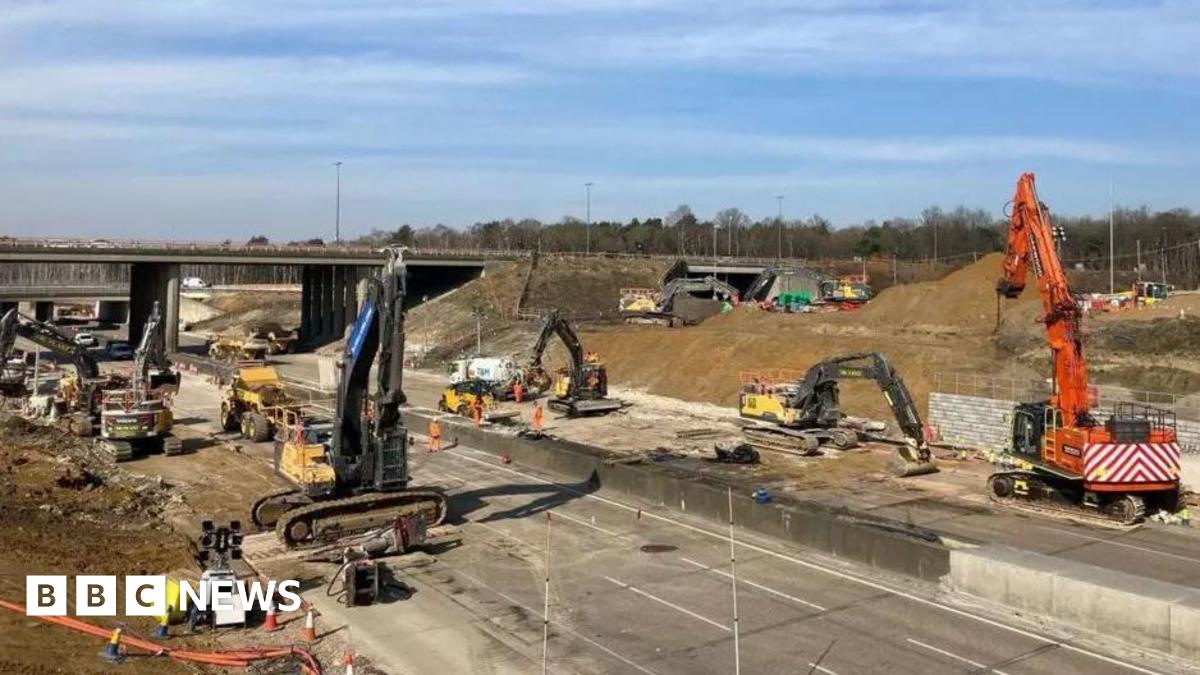You are using an out of date browser. It may not display this or other websites correctly.
You should upgrade or use an alternative browser.
You should upgrade or use an alternative browser.
Heathrow total shutdown
- Thread starter Felon
- Start date
More options
Thread starter's postsSoldato
- Joined
- 14 Jul 2005
- Posts
- 9,510
- Location
- Birmingham
One would think that something as important as Heathrow airport would have a backup power supply.
That was my first thought, does the busiest airport in Europe not have any redundancy if something like this happens?One would think that something as important as Heathrow airport would have a backup power supply.
Seems bizarre to say the least.
I'm supposed to be going to Legoland tomorrow morning I wonder if this will have a traffic effect around that bit of the M25.

M25: Drivers warned as final motorway closure begins
Work began in 2022 and is part of a delayed £317m project to improve safety and cut congestion.
This will have a bigger impact.

M25: Drivers warned as final motorway closure begins
Work began in 2022 and is part of a delayed £317m project to improve safety and cut congestion.www.bbc.co.uk
This will have a bigger impact.
Ok cheers, we are coming from the north but good shout.
''Energy Secretary Ed Miliband tells Sky News there was a backup generator but that it was "also affected by the fire".One would think that something as important as Heathrow airport would have a backup power supply.
Soldato
- Joined
- 14 Jul 2005
- Posts
- 9,510
- Location
- Birmingham
''Energy Secretary Ed Miliband tells Sky News there was a backup generator but that it was "also affected by the fire".
Seems like someone didn't do a very good risk assessment.
"We need a backup generator in case the main power supply fails through extreme circumstances, let's put it in the exact same location as the main power supply".
Well that sort of sums the UK up tbh.Seems like someone didn't do a very good risk assessment.
"We need a backup generator in case the main power supply fails through extreme circumstances, let's put it in the exact same location as the main power supply".

There seems to be a mind set that a backup plan isn't necessary.
I don't understand this attitude.
We have systems yet the powers that be thinks there is no potentially malicious actors. There are always those people around.
I don't understand this attitude.
We have systems yet the powers that be thinks there is no potentially malicious actors. There are always those people around.
Associate
- Joined
- 4 Jan 2004
- Posts
- 1,417
- Location
- Finally, Swindon
We have some friends from Australia due to arrive today
God knows where they will land - they may end up on the continent
God knows where they will land - they may end up on the continent
That was my first thought, does the busiest airport in Europe not have any redundancy if something like this happens?
Seems bizarre to say the least.
It will have at least a dozen generators. Probably two. They won't be for full operation of the airport though, only emergency and critical systems: emergency lighting, a few lifts for emergency escape, and airside will likely have its own UPS and generator systems for ATC, runway lighting, comms, etc. What they won't have backup power for is the whole terminus, so whilst they can still process a few passports and whatnot, they'll be down to a handful of PCs versus the whole shebang. The airport will still function, but at absolute minimum levels. They'll be able to process incoming passengers, albeit very slowly, but in order to shed some load they'll have to shut down all outgoing flights.
What also needs to be factored in is how much diesel they have for their generators, generally as a rule of thumb somewhere like Heathrow would be looking at 24h of runtime at max load, however this assumes that they are maintaining and monitoring their systems correctly, which I can say is more than likely not the case. To complicate matters worse, a lot of companies have taken on the additional risk of not buying diesel for the last year or so as they intend to transition to HVO, but don't want to waste the thousands of litres of diesel they have on site. Also also, red diesel was recently banned from static generator use so their diesel costs will have gone up significantly, so they might not even have their tanks full.
Of course the overarching question here is whether Heathrow is single fed, I very much doubt it, but in order to switch to another incoming supply, they'll need a few HVAPs (High Voltage Authorized Person), who will need to write a switching schedule which will need to be signed off by their SAP and tons of measure will need to be put in place before any switching can begin. It's a long, drawn out process and if anything goes wrong in the switch rooms, they'll be identifying their electricians by their teeth, so no risks can be taken.
Of course in an ideal world they'll have SOPs in place for this exact scenario so their engineering manager simply grabs the folder and runs through the motions.
Ultimately from the outside we can judge all we want, but the reality is that they might have practiced this exact scenario and are going through the motions like clockwork, we just don't see it as it "HEATHROW LOSES INCOMING POWER BUT ENGINEERING TEAM ARE MANAGING IT PERFECTLY" doesn't have a nice ring to it for the press.
Last edited:
Soldato
- Joined
- 14 Jul 2005
- Posts
- 9,510
- Location
- Birmingham
It will have at least a dozen generators. Probably two. They won't be for full operation of the airport though, only emergency and critical systems: emergency lighting, a few lifts for emergency escape, and airside will likely have its own UPS and generator systems for ATC, runway lighting, comms, etc. What they won't have backup power for is the whole terminus, so whilst they can still process a few passports and whatnot, they'll be down to a handful of PCs versus the whole shebang. The airport will still function, but at absolute minimum levels. They'll be able to process incoming passengers, albeit very slowly, but in order to shed some load they'll have to shut down all outgoing flights.
What also needs to be factored in is how much diesel they have for their generators, generally as a rule of thumb somewhere like Heathrow would be looking at 24h of runtime at max load, however this assumes that they are maintaining and monitoring their systems correctly, which I can say is more than likely not the case. To complicate matters worse, a lot of companies have taken on the additional risk of not buying diesel for the last year or so as they intend to transition to HVO, but don't want to waste the thousands of litres of diesel they have on site. Also also, red diesel was recently banned from static generator use so their diesel costs will have gone up significantly, so they might not even have their tanks full.
Of course the overarching question here is whether Heathrow is single fed, I very much doubt it, but in order to switch to another incoming supply, they'll need a few HVAPs (High Voltage Authorized Person), who will need to write a switching schedule which will need to be signed off by their SAP and tons of measure will need to be put in place before any switching can begin. It's a long, drawn out process and if anything goes wrong in the switch rooms, they'll be identifying their electricians by their teeth, so no risks can be taken.
Of course in an ideal world they'll have SOPs in place for this exact scenario so their engineering manager simply grabs the folder and runs through the motions.
In an ideal world. Which I suspect Heathrow is extremely far from.
There's no reason other than cost or poor planning that backup generators can't power the whole site. At our treatment works (water sector) we have multiple megawatts of generation capacity which can run the whole site at almost full output if the incoming power is lost.
Soldato
- Joined
- 18 Feb 2007
- Posts
- 13,746
- Location
- London
Must have been a Russian drone attack.
Water/waste water is way more of a priority than the luxury of flights though...There's no reason other than cost or poor planning that backup generators can't power the whole site. At our treatment works (water sector) we have multiple megawatts of generation capacity which can run the whole site at almost full output if the incoming power is lost.
There's no reason other than cost or poor planning that backup generators can't power the whole site. At our treatment works (water sector) we have multiple megawatts of generation capacity which can run the whole site at almost full output if the incoming power is lost.
It's cost, plain and simple.
Also, running a water treatment works is a very, very different beast to an airport. By running the whole site on generators you're looking at millions, possibly hundreds of millions of pounds of infrastructure which with it brings billions of potential failure points and maintenance costs that simply aren't worth it. So then maintenance gets cut back, the site slowly moves to a fix-on-fail model and when something like this happens and people fall down and escalator because the lights don't work, then there are dozens of lawsuits too. A few hundred thousand passengers a day brings a LOT of legal and compliance with it compared to a waterworks with a dozen engineers in it, who will likely know what to do in the event of an incident.
Makes a lot more sense to just shut it down, the risks don't justify the associated costs. This is the only time I can remember Heathrow suffering an outage like this (actually wasn't there one back in the 00s? Can't remember now) so it makes very little sense.
Also also, I just asked whether we look after Heathrow, and apparently we only do Virgin and Boeing. This means that the airport functions as a modular system rather than a whole, so this will be a lot simpler in some aspects and a lot more complicated than others.
Boss was supposed to fly back from a work trip on Tuesday got delayed due to a meeting. He was supposed to fly back today but now Heathrow is out of commission. That’s his weekend plans ruined.
An 8 business trip has been extended to 11 or 12 days.
An 8 business trip has been extended to 11 or 12 days.


